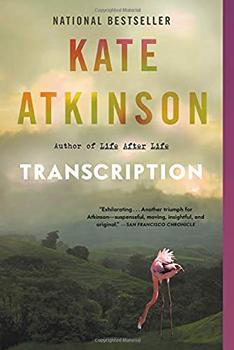Summary | Excerpt | Reviews | Beyond the Book | Read-Alikes | Genres & Themes | Author Bio

This article relates to Transcription
 "Roughly speaking, for everything that could be considered an historical fact in this book, I made something up," writes Atkinson in an author's note at the end of Transcription. One thing she did not need to augment with fiction were the amazing stories of the British Broadcasting Company during World War II, many of which are related as still-vivid anecdotes during Juliet's postwar employment there.
"Roughly speaking, for everything that could be considered an historical fact in this book, I made something up," writes Atkinson in an author's note at the end of Transcription. One thing she did not need to augment with fiction were the amazing stories of the British Broadcasting Company during World War II, many of which are related as still-vivid anecdotes during Juliet's postwar employment there.
The BBC offices and studios were considered to be likely targets for German bombing campaigns, so several departments—from Drama to Music and Variety—were transferred to various locations outside the city. Meanwhile, the producers and reporters who remained at BBC headquarters in London came to view the Criterion Theatre, the station's concert hall, as a sort of dormitory, where employees rode out much of the war by eating and sleeping where they also worked. Broadcasting House—located less than a mile from the Criterion--was indeed hit by a German bomb within the first few weeks of the Blitz campaign, while news reader Bruce Belfrage was on the air; he continued reading the news with the sound of explosions and sirens echoing behind him. Seven people died in that bombing and the fire that ensued. The BBC's studios at Broadcasting House were bombed again just two months later, as was the Maida Vale studio, farther west in London.
In her author's note, Atkinson relays an anecdote from novelist and BBC reporter George Beardmore's book Civilians at War, in which he recalls sitting outside the engineering room with a loaded shotgun, prepared to defend the studio against invasion. But the BBC also had contingency plans in place in case London became uninhabitable, including setting up operations in a disused funicular railroad tunnel in Bristol, whose structural integrity was tested by having the BBC Symphony Orchestra play in the space at full volume. In addition to Beardmore's journals, Atkinson recommends Penelope Fitzgerald's novel Human Voices, which offers a behind-the-scenes glimpse at the human dramas unfolding at the BBC during this incredibly strenuous time.
BBC's Broadcasting House after October 1940 bombing, courtesy of BBC Blogs
Filed under People, Eras & Events
![]() This "beyond the book article" relates to Transcription. It originally ran in October 2018 and has been updated for the
April 2019 paperback edition.
Go to magazine.
This "beyond the book article" relates to Transcription. It originally ran in October 2018 and has been updated for the
April 2019 paperback edition.
Go to magazine.
At times, our own light goes out, and is rekindled by a spark from another person.
Click Here to find out who said this, as well as discovering other famous literary quotes!
Your guide toexceptional books
BookBrowse seeks out and recommends the best in contemporary fiction and nonfiction—books that not only engage and entertain but also deepen our understanding of ourselves and the world around us.